
06 Sep Sparking water – should you be cleansing in it?
One that’s had some beauty buffs scratching their heads while simultaneously reaching for the Soda Stream is the sparkling water cleanse, which advocates swapping your bog-standard tap water for the fizzy stuff when you’re washing your face.
These ‘Fizzy facials’ were popularised by skincare gurus in Japan and Korea, who claim the carbonated water can help shift dirt, oil and other impurities deep within our pores while flushing the skin with oxygenated blood for radiance to be envious of.
But, can something so simple deliver so much, or is this a fad that will burst just as fast as a bubble?
According to Joel Rubin, Senior VP of Research and Development at DCL Skincare, carbonated water could have similar effects to that of a weak glycolic acid product.
He explains, “Carbonated water is created by infusing water with Carbon Dioxide. This results in the creation of a very weak acid known as Carbonic Acid. As a cleanser, it would have a similar action compared to a very dilute preparation of a glycolic acid product in that it would help slough off dead skin cells.”
Studies have found that sparkling water has a pH between 5 and 6, similar to our skin which sits around 5.5, so it slightly acidic. This acidic condition means that our skin is able to protect itself from bad bacteria and funguses while fostering the ones that keep it healthy. This acid mantle helps it shed dead cells and maintain hydration.
If the skin becomes too alkaline, it can no longer defend itself, causing dryness, irritation and other ailments. Tap water has a pH of 7 (or neutral), so in theory, using sparkling water could help in keeping the skin healthy.

Rubin states, “there would be very little drawbacks for topical use as the carbonic acid is so weak that it wouldn’t irritate the skin at all.”
But that doesn’t mean switching to the fizz will be a miracle cure for all skins.
Mayfair-based GP and aesthetics practitioner, Dr. Unnati Desai says “It’s very easy to make good skin better, but if you’ve got an underlying skin condition like acne or over-active oil glands, you need the right active ingredients in your skincare. The only thing that’s really going to unclog pores, in that case, is salicylic acid.”
Rubin agrees, saying you should be doing much more to ensure your skin is getting the care it needs than focusing on the type of water your washing in.
“I would say that a cleanser is a great way of addressing a specific skincare concern and including actives in an easy way into your skincare regime. A skincare regime that is based around cleansing using carbonated water may be in danger of lacking these ingredients.”
Instead he recommends “selecting a cleanser that is formulated for your skin type.”
For people with sensitive skin, Harley Street Emporium recommends: DCL C Scape Enzymatic Gel Cleanser
For people with acne Harley Street Emporium recommends: Zenii Salicylic Exfoliator (2% salicylic acid)
For anti-aging and pigment spots Harley Street Emporium recommends a glycolic acid cleanser: NeoStrata Foaming Glycolic Wash,
For people with rosacea, eczema or psoriasis Harley Street Emporium recommends: Exuviance Gentle Crème Cleanser or DCL Ultra Comfort Cleanser
The take-home message: If you want to use carbonated water then knock yourself out – but first and foremost, make sure the products you team it with are the right ones for your skin. If you want to learn more, speak to a specialist to get started.


No Comments